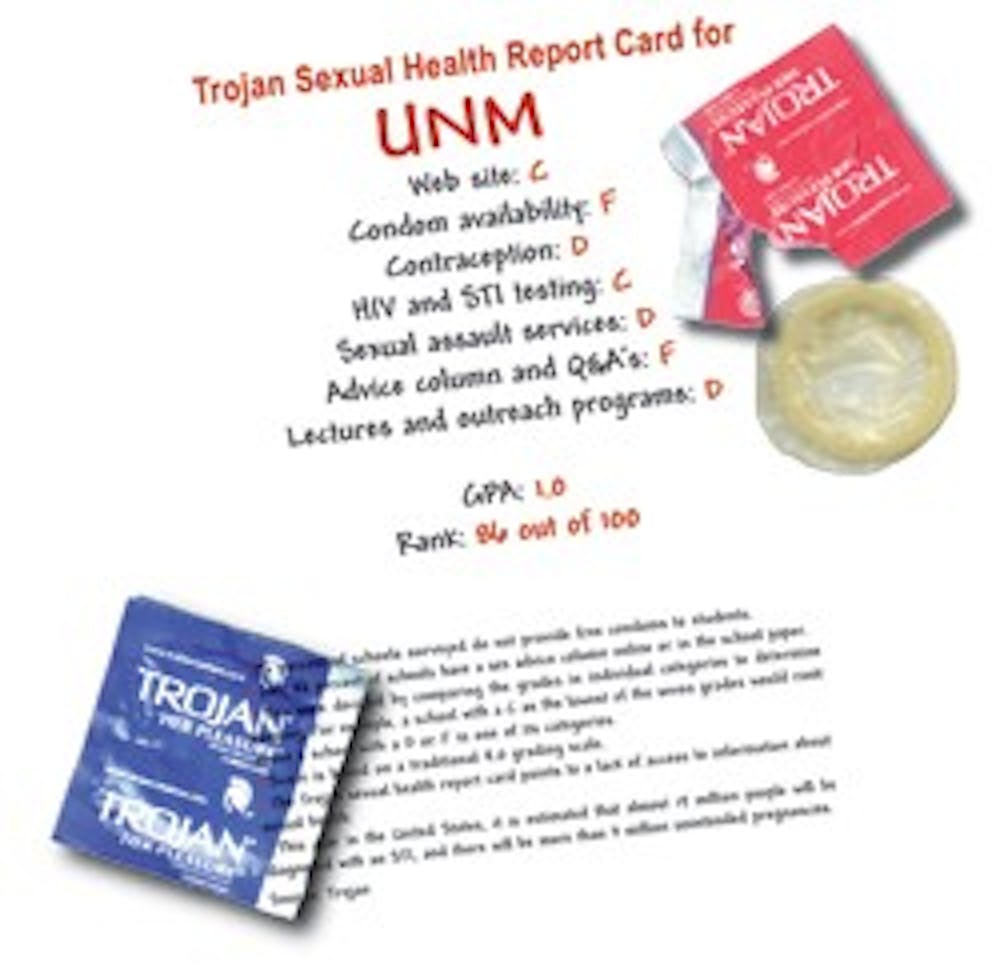by Caleb Fort
Daily Lobo
UNM is ranked 86th out of 100 colleges and universities for sexual health in a report by condom manufacturer Trojan.
The schools were graded in seven categories, including the quality of the student-health Web site and the availability of condoms, contraception and STI testing.
UNM received an F for condom availability.
Get content from The Daily Lobo delivered to your inbox
The UNM Student Health Center does not offer condoms for free. Students can buy condoms from the center's pharmacy.
"We don't have unlimited condoms available at no cost, just because we don't have the resources to make that happen," said Dr. Beverly Kloeppel, director of
the center.
Student Kristi Achatz said condoms should be available for free.
"A lot of college students are so broke that they might be stupid and still have sex without using a condom," she said.
The center gives out condoms during special events, such as health fairs.
According to the report, 76 of the schools did not offer free condoms.
UNM graduate Russel Smith said the lack of free condoms does not concern him, because he was abstinent until he got married.
However, it is something that should be improved, he said.
"I think the best solution is abstinence, but from a realistic standpoint, that's not something that everyone's going to choose," he said. "Some people are man enough to have sex, but they're not man enough to take the right precautions. We need to work on babying those people."
Student Devon Armijo said resources for sexual health are lacking at UNM.
"I think they focus a lot more on preventing alcohol and drugs than they do on encouraging safe sex," he said.
However, it is not the University's job to provide condoms,
he said.
"I think it's a personal responsibility. If you're going to engage in those behaviors - whether it's alcohol, drugs or sex - you need to be mature enough to do the right thing," he said.
UNM received a D for contraception.
"That really surprised me,
because we really try to make contraception available," Kloeppel said.
Students can get contraception, including birth control pills and intrauterine devices, at the center.
The contraception is not free.
The pills cost from $15 to $38 a month.
"I think maybe we got a D for that category because we can't offer contraception as cheaply as other schools," she said. "UNM just doesn't have the same resources as some of the other schools that got really good scores."
However, it is not hard to get contraception at the center,
she said.
"We don't make students jump through very many hoops," she said. "You can just come in and get a prescription. We don't link it to a yearly Pap smear or anything like that."
The center has a physician on call during weekends and evenings who can fill prescriptions for emergency contraception.
Yale topped the report with a perfect score. Brigham Young University got the lowest score, with an F in each category.
UNM received an F in the category of advice column or Q&A's. The Daily Lobo runs a student-written health column called "The Student Body" twice a month.
Kloeppel said a column written by health center employees would be a good idea.
"I think we could probably do a better job communicating about health issues," she said. "It would be nice to have a column where students could ask a question, not just about sexual issues but about health in general."
The center received a D for STI testing. The center does offer testing, but it is not free. The price depends on which tests are being done.
The report gave the center's Web site a C.
The site offers information about STIs and contraception, but the information is grouped with topics such as the common cold and cholesterol.
Kloeppel said she is going to look at the Web sites of schools that received good grades to try to improve the UNM site.
UNM received a D for lecture and outreach programs.
Kloeppel said the center offers peer counseling for health issues.
The center used to have counselors dedicated to sexual issues.
"They were not very utilized," Kloeppel said. "I think people don't like to come in and talk with someone about sexual issues. It's something they'd rather do anonymously."
Kloeppel said she will take the report with a grain of salt.
"I'm never willing to say there are areas we can't improve on," she said. "But, I would rather know how the students feel about the resources on campus than what Trojan thinks. That's the voice I'm most responsive to."






